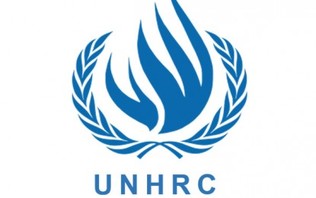Panel discussion on human rights and digital technologies: New insights
23 Jul 2019 15:00h - 16:00h
Event report
The side event of the UN Human Rights Council was organised by the Geneva Human Rights Platform, the Geneva Academy, Special Procedures of the UN Human RightsCouncil, the Swiss Federal Department of Foreign Affairs, and the Geneva Internet Platform. The session was moderated by Ms Stefania di Steffano (Geneva Academy) who said that the discussion about human rights in relation to technological developments is gaining momentum and being addressed at different human rights forums.
Mr Yuval Shany (Vice-Chair, UN Human Rights Committee, and Hersch Lauterpacht Chair in Public International Law, the Hebrew University of Jerusalem) explained that the starting point for human rights in the digital context is that rights which are applicable offline are also valid online. This fact has been recognised by multiple UN resolutions. It is thus important to explore how to transition offline rights to the digital space, while preserving equal levels of protection. However, Shany emphasised that the debate about human rights in the digital sphere must go even further in order to cover new situations which have been created by technological developments and require new solutions.
Shany indicated that there are three generations of rights. The first generation describes the traditional rights which apply online but need to be slightly adapted to capture the reality of cyberspace. The second generation designates new phenomena which are appearing with new digital technologies and need to be addressed through the creation of new norms. Finally, the third generation of rights will need to deal with new rightsholders and responsibility online.
Mr Clément Voule (UN Special Rapporteur on Rights to Freedom of Peaceful Assembly and of Association) explained that his report expanded on the impact of digital technologies on the rights to freedom, as well as freedom of assembly, and that it analysed the digital sphere as a space in which these rights can be enjoyed or abused.
Voule noted that cyberspace provides many countries with the ability to set national agendas due to the opportunities of greater participation that it can create. He also indicated that his report gives an example of how people fully organise themselves through online means. Moreover, Voule spoke about the importance of the Internet for marginalised groups, as it is often the only place where they can exchange information and ideas. Digital space therefore offers a powerful platform for the exercise of rights to freedom, but can also be used, for example, for mass surveillance and government sponsored-bullying.
According to Voule, there is still room for the implementation of digital issues in existing human rights frameworks. He indicated that, while it is possible to create new norms and regulations, it is important to exhaust the existing frameworks first, before creating new and overlapping ones.
Mr Jonathan Andrew (Research Fellow, the Geneva Academy of International Humanitarian Law and Human Rights) noted that there is a paradox which is created by technological innovation which determines how we respond and adapt to it. According to Andrew, the notion of foreseeability in the context of human rights protection is very important, and that striking a balance between innovation and protection is very difficult. Therefore, it is necessary to bring different communities together to find common solutions to both technological and human rights issues.
In this regard, Andrew also highlighted that it is vital to ask important questions, such as those regarding what kind of autonomy is desirable, which rights must be upheld, and how. The question of the right to Internet access is just part of the issue, given that we must also consider which rights apply once we are connected. Some of the challenges include mass data collection and the understanding of the implications of such issues on the dignity of individuals.
Andrew recommended scenario planning as a viable approach to projecting possible futures from which it would be much easier to infer what can be deemed acceptable and which trends need to be addressed immediately.
Mr Jovan Kurbalija (Executive Director, Secretariat of the UN High-Level Panel on Digital Cooperation) explained that with mobile technologies such as smartphones, many regulatory frameworks have been condensed into small devices. This condensation is creating new tensions and adds to the fact that human rights are increasingly under enormous competition from other fields such as standardisation bodies, commerce and trade forums, and intellectual property rights. Kurbalija indicated that some of these organisations have significant influence over human rights by setting standards which will be widely adopted, such as in the case of 5G connectivity. Therefore, according to Kurbalija, if the human rights community does not actively bring the human rights debate outside its own institutions, it will lose much ground to these other actors.
Moreover, Kurbalija spoke about the need to establish a right to be imperfect. He explained that the continued optimisation of technology and the enhancement of ourselves will reduce our agency to make our own decisions. He argued, however, that these decisions are part of our humanity and are an essential part of our dignity.
Related topics
Related event

